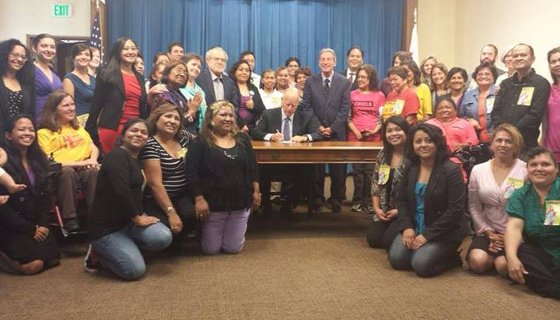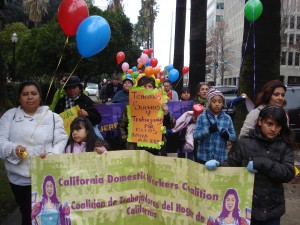By Rocío Alejandra Avila, a Senior Fellow at the Women’s Employment Rights Clinic of Golden Gate University School of Law. She is a Chicana/Latina community lawyer from San Francisco and a longtime immigrant rights activist and a domestic worker advocate.
In the midst of an explosive rise of anti-immigrant policies since the 1990’s in California with Proposition 187 and across our country, a powerful social movement – the Domestic Worker Movement- was born and today is a beacon of hope for “transformational social change.” The Movement’s began in the mid 1990’s in the streets of San Francisco, New York City, and Los Angeles. From the east coast to the west coast, Caribbean, African, Latin American, and Asian domestic workers began to gather at their homes, parks, and worker centers to build community and to find solutions to the labor exploitation they were subjected to as nannies, caregivers, and housecleaners. Almost 20 years later, these women and community leaders are leading legal reform campaigns to eliminate labor law exclusions, and the root causes that give rise to the subjugation of domestic workers.
As a community lawyer and an activist, I often wonder: is the community-centered organizing model used by the Domestic Worker Movement furthering our quest for social justice? I have thought about these above questions extensively as one of the several lawyers who serves as counsel to the California Domestic Worker Coalition (Coalition) that led the struggle for successful passage of the 2013 California Bill of Rights. They also stem from my community organizing experience prior to law school, in the founding years of some of the Northern California domestic worker organizations, and eight years of legal advocacy and representation of domestic workers. In these roles, I have personally seen the evolution and transformation of many of the organizations, the worker leaders, and members.
The Domestic Workers Movement should not be viewed as a movement limited only to defending and advancing the rights of domestic workers because it is not. It is a grass-roots movement that is grounded on the fundamental tenet of achieving “transformational social change” in our society while organizing domestic workers as a vehicle to achieve it. Domestic Worker Bill of Rights now passed in New York, Hawaii, California, and Massachusetts, have been successful in extending substantive legal rights that were previously denied to some domestic workers, but most importantly, in galvanizing domestic workers to create organizing models that promote and uphold their human rights and that of their families, and communities in the civil, political, economic, social, and cultural arenas.

Domestic Worker Movement’s legal reforms campaign and the community-centered organizing models have also facilitated the advocacy efforts of other policy issues impacting domestic workers. Domestic workers are the leading voice in Sacramento and Washington, D.C., advocating for just immigration reform, the elimination of the Secured Communities Program, and driver’s licenses for undocumented immigrants. Domestic workers have and continue to be fight every day to resist and combat the inequities they face as immigrant workers and to transform their lives, neighborhoods, and the institutions that oppress them. It is important to bear in mind that these organizing campaigns and legal reforms have occurred in a context of record-breaking immigration deportations that are breaking families, including those of domestic workers.
However, aside from these legal gains, the Movement’s success is premised primarily on the “personal transformation” of each domestic worker member through the leadership development and community-centered organizing. For me, “personal transformation” happens when the mind and soul of the workers are empowered and they are given the necessary tools to become community leaders. The process toward “personal transformation” at its core acknowledges the various ways that domestic workers are marginalized not just as immigrant workers, but also as women and mothers.
In order to organize and build a movement for and led by domestic workers, the Movement has to focus on providing its members the tools to break-down the institutional barriers that impede their personal and professional development. La Colectiva de Mujeres (The Women’s Collective) of the San Francisco Day Labor Program is a prime example of it. La Colectiva de Mujeres, founded and led by Guillermina Castellanos, former domestic worker and now immigrants rights leader, is a worker-run cooperative that helps immigrant women find employment, earn prevailing wages, and educates and empowers them to become active community leaders. La Colectiva’s strength lies in effectively combining “personal transformation” tools, such as job development skills, with political and community empowerment strategies to transform its members. A pivotal component of this process involves an emphasis on developing the social and political consciousness of its members through regular popular education trainings. These trainings provide them with the political and ideological framework to tackle the issues that they face on a daily basis, such as the socioeconomic and political reasons that trigger their migration to the United States or the legacy of slavery, racism and sexism that are the basis for the labor law exclusions that marginalize them as domestic workers in this country.
I believe the California Domestic Worker Coalition is an example that “transformational personal change” can occur. The Coalition achieved its dual purposes of extending substantive legal protections never before afforded to certain categories of domestic workers, raising the industry standards. But perhaps more importantly, the Coalition has created a cultural shift within our society that challenges us all to respect and value the labor of domestic workers.
To better understand this personal transformation, which is often difficult to quantify in the same ways we can point to laws or campaigns, I interviewed some of the Northern California worker leaders and organizers and asked them if they consider the CA Domestic Bill of Rights to be a success? If so, why? I spoke with Juana Flores, Co-Director and founding member of Mujeres Unidas Y Activas (MUA), who is also a former domestic worker, and Emiliana Acopio, a seventy-five year old domestic worker leader in Filipino Advocates for Justice (FAJ) advocating for immigrant and domestic workers’ rights.
Flores: “Yes, the California Domestic Worker Bill of Rights is a success for two reasons: 1) we got overtime protections for the domestic workers that didn’t have it; 2) the workers and community have been transformed as a result of the campaign.” According to Flores, the transformation happens when there is a “shift in consciousness of the workers, when they begin to internalize that their work merits dignity and respect, and when this happens they begin to fight for equal rights, and then a leader is born.”
Acopio: “Yes, it was a moment I’ve been waiting for years. When I was next to Governor Jerry Brown and Assemblyman Tom Ammiano at the signing of the bill, I cried tears of joy.” The success for me was to see all of our hard work come to fruition. “I never imagined that I would go to Sacramento and speak in rallies and do legislative visits and people would hear about my story.” They heard me and because of that we have a bill of rights.”
Flores speaks from experience, she joined MUA in the mid 1990’s and was transformed, as she describes, from a shy domestic worker member that didn’t know her rights to feeling empowered to assert them. She is now a national and international domestic worker leader and advocate. She has testified before the ILO Convention in Geneva, Switzerland on behalf of domestic workers and is today a recognized leader. Similarly, for Acopio, at the start of her community work, she was shy and didn’t want to speak in public or to talk about her own story as a worker in her home country or as a caregiver in the United States. Today thirteen years later, Acopio now is one of the strongest leaders of the Northern California Domestic Worker Movement.
Avila: What triggered your transformation and that of other workers?
Flores attributes her personal transformation to the community education and leadership development that she received at MUA. Flores said, “in the early organizing years, we formed small groups where women would talk about their problems, among them was their employment issues, over time at MUA we knew that if we wanted to engage in legislative campaigns to change the working conditions for domestic workers, we first had to start by building our membership base through outreach and education that addressed the multiple issues faced by immigrant women and the power dynamics that very often keep our members marginalized at home and in the workplace.”
Acopio emphasized that she would have never been a part of the Movement if it had not been for the community support she has received from FAJ. She said that FAJ is like her home, she trusts them and knows that when workers unify great things can happen. She feels she was transformed by the leadership development and know your rights trainings. She now knows her rights and is willing to fight with other workers for better conditions. The “personal transformation” that both Flores and Acopio refer to involves focusing on the needs of the members.
For Flores, this means providing intensive peer education that addresses domestic violence, fear and anxiety of retaliation and deportation, and providing some type of safety net for the members and their families. She believes that community education, such as the “know your rights” presentations on worker and immigration rights is fundamental for the members to gain the trust of the worker centers. This process gives members the tools to believe in themselves and to get involved in their communities. Flores added, “the members become spokespeople of their own social cause, which is when a leader is born.”
Avila: Has the various Domestic Worker Bill of Rights eradicated the root causes that give rise to the social and political inequality that domestic workers are subjected?
Flores said, “No, in order to achieve that we need a lot of more people power.” What we’ve learned is that nobody gives us any protections, we have to fight for them, when we get them we have to enforce them, but it does not end there, because we have to continue to build the consciousness of more workers to change the systems that are mistreating us as women and immigrants.”
For Flores, “transformational social change” happens over time one worker at a time and we need two things to achieve it: 1) we need to reach a large base of workers and 2) then we need to organize them into strategic campaigns that ultimately will link with other movements.
Acopio: “No, I do outreach and tell caregivers about the new law and they are still afraid of filing complaints to get their overtime.” Domestic workers are still being exploited according to Acopio and she believes that this is because employers take advantage of them because they are undocumented. She added that despite the continuous exploitation of domestic workers the sacrifices that were made by thousands of domestic workers to pass the bill in Sacramento was worth it to her. It was worth it because domestic workers got the courage to speak at rallies and to march in the streets of Sacramento.” For Acopio, that shows that “we are not afraid and that after all we can defend ourselves and say that it’s not okay for employers to take advantage of us. We said No more!”
The Coalition’s success is rooted in its ability to transform its members into becoming agents of “transformational social change.” The Coalition succeeded in changing the discourse of domestic work, bringing it out of the “shadows” of the private home and into the public sphere after years of organizing and leadership development. While for the workers and for me, the Movement has been a profound life changing experience nourished by our commitment to social and economic justice. From the “Mujeres” (Women), I’ve learned that community-centered organizing is an act of love for humanity and with it we can achieve the unthinkable.







Another CA Bill AB1667, the Home Care Consumer Protection Act of 2016 aims to further legitimatize the Domestic Referral Home Care Agencies as licensed Home Care Agencies without sufficient disclosures for the senior consumers in respect to the clients “employer responsibilities” . And because AB241 the Domestic Worker Rights Bill of 2013, exempted the DRAs ( CA civil code 1812.5095 from the minimum wage and overtime requirements but not their clients who have that onus, many of the workers that AB241 was written to protect are not only denied the traditional employment “entitlements through SDI/FICA but are underpaid per AB241 and the Mendiola sleep time decision by at least $100 a day or more. This “oversight in AB241” is creating a huge underpaid work class.
Attorneys and EDD have advised private pay families of their legal obligations but the DRA agencies are capitalizing on this quasi-legal loophole.